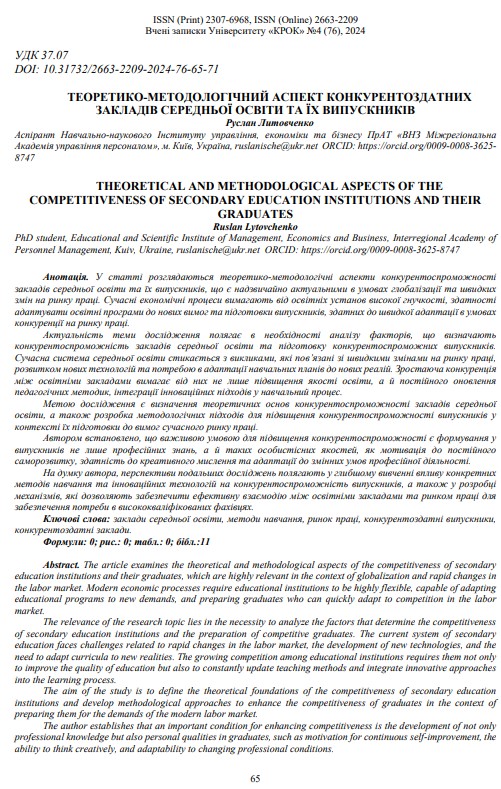ТЕОРЕТИКО-МЕТОДОЛОГІЧНИЙ АСПЕКТ КОНКУРЕНТОЗДАТНИХ ЗАКЛАДІВ СЕРЕДНЬОЇ ОСВІТИ ТА ЇХ ВИПУСКНИКІВ
DOI:
https://doi.org/10.31732/2663-2209-2024-76-65-71Ключові слова:
заклади середньої освіти, методи навчання, ринок праці, конкурентоздатні випускники, конкурентоздатні закладиАнотація
У статті розглядаються теоретико-методологічні аспекти конкурентоспроможності закладів середньої освіти та їх випускників, що є надзвичайно актуальними в умовах глобалізації та швидких змін на ринку праці. Сучасні економічні процеси вимагають від освітніх установ високої гнучкості, здатності адаптувати освітні програми до нових вимог та підготовки випускників, здатних до швидкої адаптації в умовах конкуренції на ринку праці.
Актуальність теми дослідження полягає в необхідності аналізу факторів, що визначають конкурентоспроможність закладів середньої освіти та підготовку конкурентоспроможних випускників. Сучасна система середньої освіти стикається з викликами, які пов’язані зі швидкими змінами на ринку праці, розвитком нових технологій та потребою в адаптації навчальних планів до нових реалій. Зростаюча конкуренція між освітніми закладами вимагає від них не лише підвищення якості освіти, а й постійного оновлення педагогічних методик, інтеграції інноваційних підходів у навчальний процес.
Метою дослідження є визначення теоретичних основ конкурентоспроможності закладів середньої освіти, а також розробка методологічних підходів для підвищення конкурентоспроможності випускників у контексті їх підготовки до вимог сучасного ринку праці.
Автором встановлено, що важливою умовою для підвищення конкурентоспроможності є формування у випускників не лише професійних знань, а й таких особистісних якостей, як мотивація до постійного саморозвитку, здатність до креативного мислення та адаптації до змінних умов професійної діяльності.
На думку автора, перспективи подальших досліджень полягають у глибшому вивченні впливу конкретних методів навчання та інноваційних технологій на конкурентоспроможність випускників, а також у розробці механізмів, які дозволяють забезпечити ефективну взаємодію між освітніми закладами та ринком праці для забезпечення потреби в висококваліфікованих фахівцях.
Завантаження
Посилання
Андріяко Т. Ю. (2010). Педагогічна сутність і структура конкурентоспроможності фахівця. Педагогічна наука: історія, теорія, практика, тенденції розвитку. Вип. N 3.
Верхоглядова Н. І. (2005). Управління конкурентоспроможністю вищої освіти в процесі формування людського капіталу : дис. … д-ра екон. наук: 08.02.03 / Дніпропетровський національний ун-т. Дніпропетровськ, 503 с.
Calderon A. (2015). What will higher education be like in 2040? University World News. 11 September. http://www.universityworldnews.com/article.php?story=20150908145912643&fb_action_ids=775584649217085&fb_action_types=og.likes&fb_ref=.VfUcG9o5vmQ.like
Гриник І., Хавула Р. (2022). Теоетичні підходи до проблеми конкурентоспроможності особистості. Науковий вiсник Херсонського державного унiверситету. Серія: Психологічні науки. Вип. 2. С. 14–19
Медведь В. В. (2011). Основи формування конкурентоспроможності фахівця: чинники, складові, критерії. Теорія та методика управління освітою. N7. С. 45–49.
Невмержицька М.В. (2014). Формування конкурентоспроможної особистості в умовах масового суспільства : дис ... канд. філософ. наук : 09.00.03 ; КНУ ім. Т. Г. Шевченка. Київ, 201 с.
Povidaichyk М., Illiuschenko S., Dorosh Т., Demyanenko N., Ostapenko L., Maksymenko А. (2021). The Problem of Developing the Reflexivity of Future Specialists in Social and Humanistic Sciences in the Context of Postmodernism. Postmodern Openings. N4. Vol. 12. Р. 171–183.
Шепеленко Т. (2016). Психолого-педагогічні основи формування конкурентоспроможності майбутнього фахівця економічного профілю у процесі професійної підготовки. Педагогіка вищої та середньої школи. Вип. 48. С. 150-155.
Шнипко О. С. (2003). Національна конкурентоспроможность: сутність, проблеми, механізми реалізації. Наукова думка. 324 с.
Scott C .B, Bradford C .J, James M. M. (2006). Competitive advantage from better interactions. Mckinsey Quarterly. N2. Р. 52–63.
Toffler A., Toffler Н., Gibson R. (1998). Rethinking the Future: Rethinking Business Principles, Competition, Control and Complexity, Leadership, Markets and the World. Hardcover: Publisher John Murray Press. 288 р.

Downloads
Опубліковано
Як цитувати
Номер
Розділ
Ліцензія

Ця робота ліцензується відповідно до Creative Commons Attribution-NonCommercial 4.0 International License.

